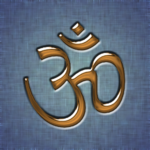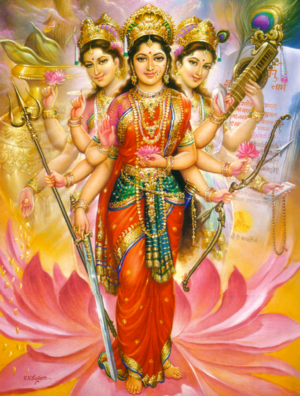Portal:Hinduism
2008/9 Schools Wikipedia Selection. Related subjects: Portals; Religious movements, traditions and organizations
|
Hinduism (Sanskrit Hindū Dharma—हिन्दू धर्म, also known as Sanātana Dharma सनातन धर्म, and Vaidika Dharma वैदिक धर्म) is a religion originating in the Indian subcontinent, based on the Vedas, and the oldest religious traditions still practiced today. The term, "Hinduism," is heterogeneous, as Hinduism consists of several schools of thought. It encompasses many religious rituals that widely vary in practice, as well as many diverse sects and philosophies. Most Hindus believe in a Supreme Cosmic Spirit, which may be understood in abstract terms as Brahman or which may be worshipped in personal forms such as Vishnu, Shiva or Shakti. The religion is classified by many different forms of theism such as monotheism, monism, pantheism, polytheism and even atheism. Hinduism is the third largest religion in the world with approximately 970 million adherents, (2006), approximately 900 million of whom are in India.
The Upanishads ( Devanagari: उपनिषद्, IAST: upaniṣad) are part of the Vedas and form the Hindu scriptures which primarily discuss philosophy, meditation and nature of God; they form the core spiritual thought of Vedantic Hinduism. The Upanishads are mystic or spiritual contemplations of the Vedas, their putative end and essence, and thus known as Vedānta ("the end/culmination of the Vedas"). The Upanishads were composed over several centuries. The oldest, such as the Brhadaranyaka and Chandogya Upanishads, have been dated to around the eighth century BCE. The philosophical edifice of Indian religions viz., Hinduism, Jainism, Buddhism is built on the foundation laid by the Upanishads.
Adi Shankara ( Malayalam: ആദി ശങ്കരന്, Devanāgarī: आदि शङ्कर, Ādi Śaṅkara, IPA: [aːd̪i ɕəŋkərə]). Adi means "the first"; the heads of a few Hindu mathas are also given the title Shankaracharya; Acharya which means "teacher". Shankara was the first philosopher to consolidate the doctrine of Advaita Vedanta, a sub-school of Vedanta. His teachings are based on the unity of the soul and Brahman, in which Brahman is viewed as without attributes. In the Smārta tradition, Adi Shankara is regarded as an incarnation of Shiva. Adi Shankara toured India with the purpose of propagating his teachings through discourses and debates with other philosophers. He founded four mathas ("abbeys") which played a key role in the historical development, revival and spread of post-Buddhist Hinduism and Advaita Vedanta. Adi Shankara was the founder of the Dashanami monastic order and the Shanmata tradition of worship.
The Hindu religion is the only one of the world's great faiths dedicated to the idea that the Cosmos itself undergoes an immense, indeed an infinite, number of deaths and rebirths. It is the only religion in which the time scales correspond, to those of modern scientific cosmology. Its cycles run from our ordinary day and night to a day and night of Brahma, 8.64 billion years long. Longer than the age of the Earth or the Sun and about half the time since the Big Bang. And there are much longer time scales still. — Carl Sagan (1934-1996) famous astrophysicist.
|




